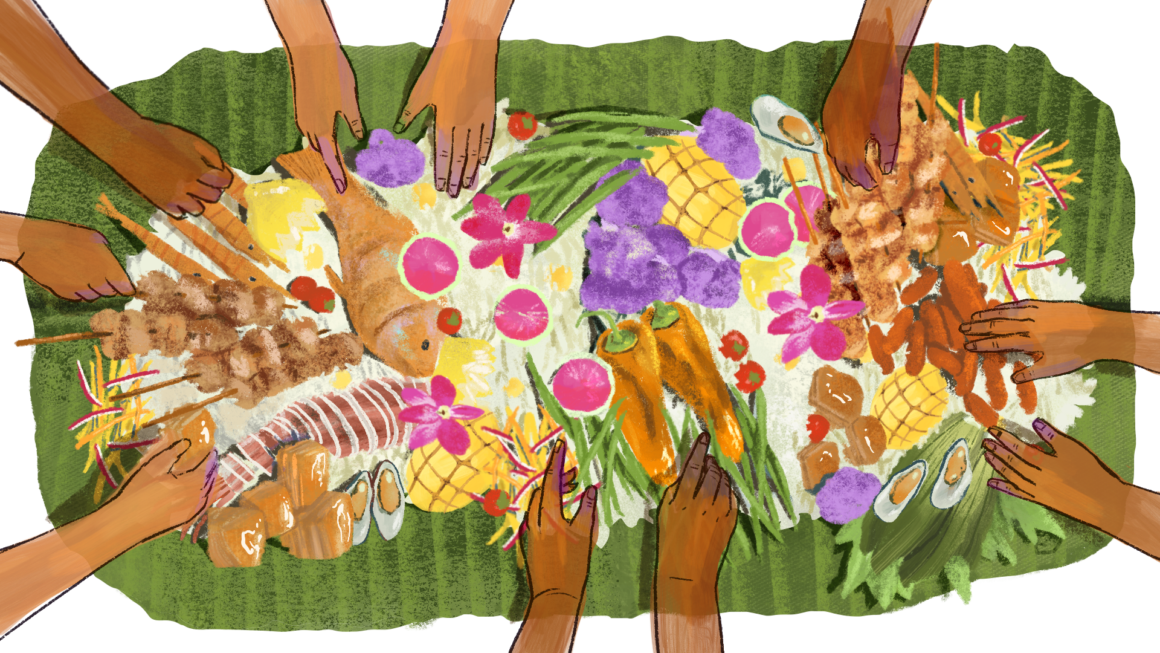Today, we’re sitting down with nelli agbulos, past Race & Food cohort member, and a former New Yorker and an honorary New Jerseyan. The following interview has been edited for clarity and flow.
christina: So this week on Instagram, we’re talking a bit about ‘lunchbox stories’, and how they can be a great tool for identifying shared experiences in organizing, but also asking questions about how we can connect experiences at an individual level to collective organizing. I’m curious though: do you have a ‘lunchbox story’?
nelli: I actually don’t have a lunchbox story! I grew up surrounded by a large Filipino community, and so I never really felt othered in the way that people usually associate with those specific types of stories.
c: Neither do I, actually! I think it’s really important to normalize this idea of diverse experiences, even within racialized communities, and that there is no ‘right’ or ‘correct’ way to belong to a community.
n: For me, this really resonates in a slightly different way that is still related to food. I’ve been a vegan for the past five years, but for a lot of folks in the Filipino community, dairy and meat are a huge part of our food culture. For a long time, I had felt feelings of guilt and disconnection from my community for this reason.
For the Race & Food cohort zine, I wrote about Kamayan, which is a Filipino tradition where food is piled out on a table on top of banana leaves. The spread includes crab legs, seafood, lechon (pork), tilapia, vegetables, pancit (noodles), and rice.
As someone who doesn’t eat meat, it was hard for me to feel like I could fully participate in such a big part of our culture, because I didn’t feel represented in the food.
I spent the meal slowly eating what I could, and craving baked tofu and soy nuggets that would complement the pancit. I know that these traditions are important to my community, as a way of celebrating and bringing family together, but I was longing for a way to bring my own values to this tradition.
c: I think that really gets at the core of this kind of diasporic angst that we face, trying to bring our whole selves into different spaces. I know some friends who are vegetarians most of the time, but when they visit their homelands, or participate in big festivals like Lunar New Year, they make concessions on those things to continue traditional practices.
n: Yes, absolutely. Like, when I visit the Philippines, I eat very differently for a bunch of reasons. First of all, I love the food my grandparents make. And for some foods, they’re really good as they are, and hard to replicate or substitute. There’s also a big class difference there too. My family [in the Philippines] is poor, and so they eat what they can. I choose to be a vegan for political and ethical reasons, but I get to define what that means for me, because food is so personal. Even if I’m not a ‘perfect vegan’, it’s more important to me to think about it as part of an entire system, not what individuals contribute to the environment.
In some ways participating in the Race & Food workshops gave me the confidence to be more open about my complex relationships with food and culture. I felt that if I could share these feelings in a room with relative strangers, I could begin to be more open about it with others. It was very cathartic to write that piece, and I’m really grateful to Jackie [Wong, past hua foundation staff] for creating such a safe space, one that I could talk about topics that I didn’t even feel comfortable talking with my friends at the time.
One of the biggest things that stuck with me from those workshops was that: food isn’t diet culture, it’s the stories we feed ourselves. It’s our lolas and lolos, the time our moms burnt their hands making something for us; it’s the memories associated with food.
c: Thank you for sharing that. It’s definitely very resonant to feel this sense of disconnect between all of the different pieces of ourselves.
n: Yes, at the time it was really tough for me, but looking back I’m Filipino and shouldn’t have felt that way.
I can still make these choices, and that doesn’t make me any less Filipino than anyone else.
Meeting [other members of the cohort, especially other Filipino people] who shared these experiences really helped me to see that.
c: Can you tell me a bit more about your more recent work, connecting with the Filipino community here?
n: I’ve been working with GABRIELA BC, an overseas chapter of the Philippine-based organization that struggles for the liberation of all oppressed Filipino women and dismantling imperialism. The organization is named in honor of GABRIELA SILANG, the first Filipino woman to lead a revolt against the Spanish colonization of the Philippines. I actually heard about GABRIELA originally through the New York chapter while I was going to school there. I had stumbled on their work through Instagram and was inspired by the way that they tap into creativity for their organizing, through poetry and other creative events. From what I saw online, they shared history, politics, and culture, addressing all of these things creatively, but in ways that made the present matter.
It stood out to me, as someone who was never really good at studying history, because the way that they did it really helped me to connect with the history of my community in a way that I could understand, through plays and storytelling.
c: Oh, I love that! For me, as someone who is Cantonese, so much of our culture is around gathering and storytelling, often around a dinner table. And due to the complex politics of language, there really isn’t a standardized written version of the language that I spoke at home [Toisanese], so the only way that I learned about my family’s history is through storytelling. It seems to be a shared thread with a lot of racialized communities!
n: Yes for sure! And when I participated in the new member orientation at the BC chapter, I learned so much about the history, specifically about Filipina women, which was so special because the way that we conduct it, it’s really sharing and story time. GABRIELA B.C. has really been a space to be able to see people connect the dots about our diasporic heartache, and to have discussions [on the economic conditions of Filipina women workers and peasants] over karaoke, over food. It’s heartwarming.
c: I think that’s what really makes history stick with us. I’m not great with remembering facts or dates from history either, but being able to hear the stories of my elders and community members feels like second nature.
n: Shortly after the Race & Food workshops, I was working as a youth services coordinator, and for one of the programs I facilitated, I brought the group to attend the annual Women’s Memorial March for Missing and Murdered Indigenous Women and Girls (MMWIG) that happens every year on Valentines Day. I was pretty impressed that all 10 of the youth as well as my team members (Vania, Josh, and Malia <3) stayed and paid attention the whole afternoon. After the rally, we had a late afternoon snack at New Town Bakery [in Chinatown], and had a chance to reflect on the event.
You could feel some of that awkwardness around the table, but it was amazing to hear the youth talk about colonialism and their families’ own migration stories, in a really vulnerable way. And as we know, it’s not ‘cool’ to be vulnerable in high school! I think the difference was that they weren’t in a school setting, and it really felt like a place where they could share. We had a group of teenagers talking about colonialism for an hour without looking at their phones!
c: That’s amazing! I think you’re spot on there. When we remove that power dynamic that’s a big part of the way that history is taught, it feels so much more familiar, and a better space to learn.
n: Yes, one thing that I really tried to embody in my short time there was that they’re not just my statistics, these are people I genuinely care about.
c: That’s such a lovely and hopeful note to end on! Thank you so much, nelli, for all of the work you do in the community, and for taking the time to sit down with me and share some of the things you’ve learned through these experiences.
You can find out more about GABRIELA BC on Instagram, @_gabrielabc. GABRIELA BC is a proud member of BAYAN Canada, an alliance of Filipino organizations in Canada representing students, scholars, women, workers, artists, and youth.


